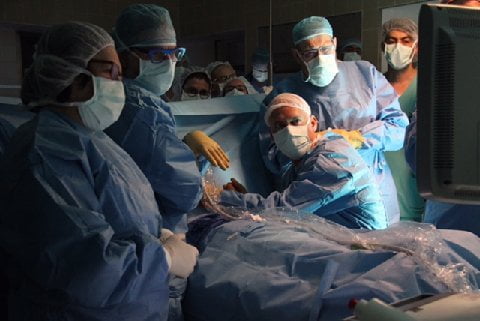For the first time in Israel, an interdisciplinary team of Hadassah doctors performed a risky and delicate procedure called “aortic balloon valvuloplasty” in-utero, to save the life of a 28-week-old fetus with a severe heart defect.
Aortic valvuloplasty is the widening of the aortic valve using a balloon catheter inside the valve. This procedure was performed last week inside the womb of a woman, at Hadassah Hospital Ein Kerem in Jerusalem.
The operation, which widened the fetus’ aorta, is almost identical to an adult catheterization. One day after the surgery, the condition of the fetus’ heart improved significantly.
SEE ALSO: Israeli 3D Printing Technology Helps Surgeons Separate Conjoined Twins
The surgical team was led by Dr. Azaria Rein, Director of Pediatric Cardiology at Hadassah, a world-renowned authority on embryonic birth defects.
“The diagnosis was a critical narrowing of the aortic valve, which was also accompanied by severe damage to the function of the left ventricle that was barely able to contract,” Rein said in a statement. “Without treatment, the left ventricle would likely degenerate and not be able to transfer blood to the baby’s body after birth.”
“Trailblazers in the field of embryology and cardiology”
The surgery was performed under epidural anesthesia for the mother and anesthesia for the fetus. “We inserted a very delicate needle through the mother’s abdominal wall directly to the left ventricle of the fetal heart,” Gielchinsky explains. “It was a complex and delicate procedure that required maximum concentration and precision.”
Then, Gavrim passed a narrow wire through the needle to the aorta, through the valve with a balloon that was inflated to enlarge the aorta. “Immediately after the operation, we saw an improvement in blood flow through the valve,” he says, noting that on the morning after the surgery, the function of the left ventricle in the fetal heart improved significantly.
Sign up for our free weekly newsletter
SubscribeHadassah Medical Organization was the first hospital in Israel to perform this rare procedure, which is done in only a few centers around the world, according to Gielchinsky. “We are now trailblazers in the field of embryology and cardiology,” he said.
Additional doctors taking part in this complex surgery include Dr. Sagi Gavrim, Director of Pediatric Catheterization Services; Dr. Yuval Gielchinsky, Head of Obstetrics Medicine; Dr. Simcha Yagel, Director of Obstetrics and Gynecology; obstetrician and gynecologist Dr. Nili Yanai; and anesthesiologist Dr. Carolyn Weiniger.
The world’s first-ever dual robotic surgery
Recently, Hadassah Hospital Ein Kerem surgeons preformed the world’s first-ever dual robotic surgery, using Israeli technology. The 42-year-old patient who underwent the procedure is able to walk again after a heavy steel frame had fallen on him.
The revolutionary dual robotic surgery, performed earlier this year, repaired a severe spinal fracture suffered by a factory worker who had been injured when a steel object pinned him to the ground, fracturing his leg in two places and breaking six of his spinal vertebrae.
SEE ALSO: Using Israeli Tech, Hadassah Surgeons Perform World’s First-Ever Dual Robotic Surgery
The pioneering procedure utilized two robots, Siemens’ Artis Zeego and Mazor Robotics’ Renaissance Guidance System. The latter is a screw placement system, which allows spinal implant placement with safety and accuracy, and was developed in Israel. Mazor Robotics’ guidance systems enable surgeons to conduct spine and brain procedures in a precise manner.
Photos: Hadassah Medical Organization, Siemens
Related posts

Israeli Medical Technologies That Could Change The World

Harnessing Our Own Bodies For Side Effect-Free Weight Loss

Missing Protein Could Unlock Treatment For Aggressive Lung Cancer






Facebook comments